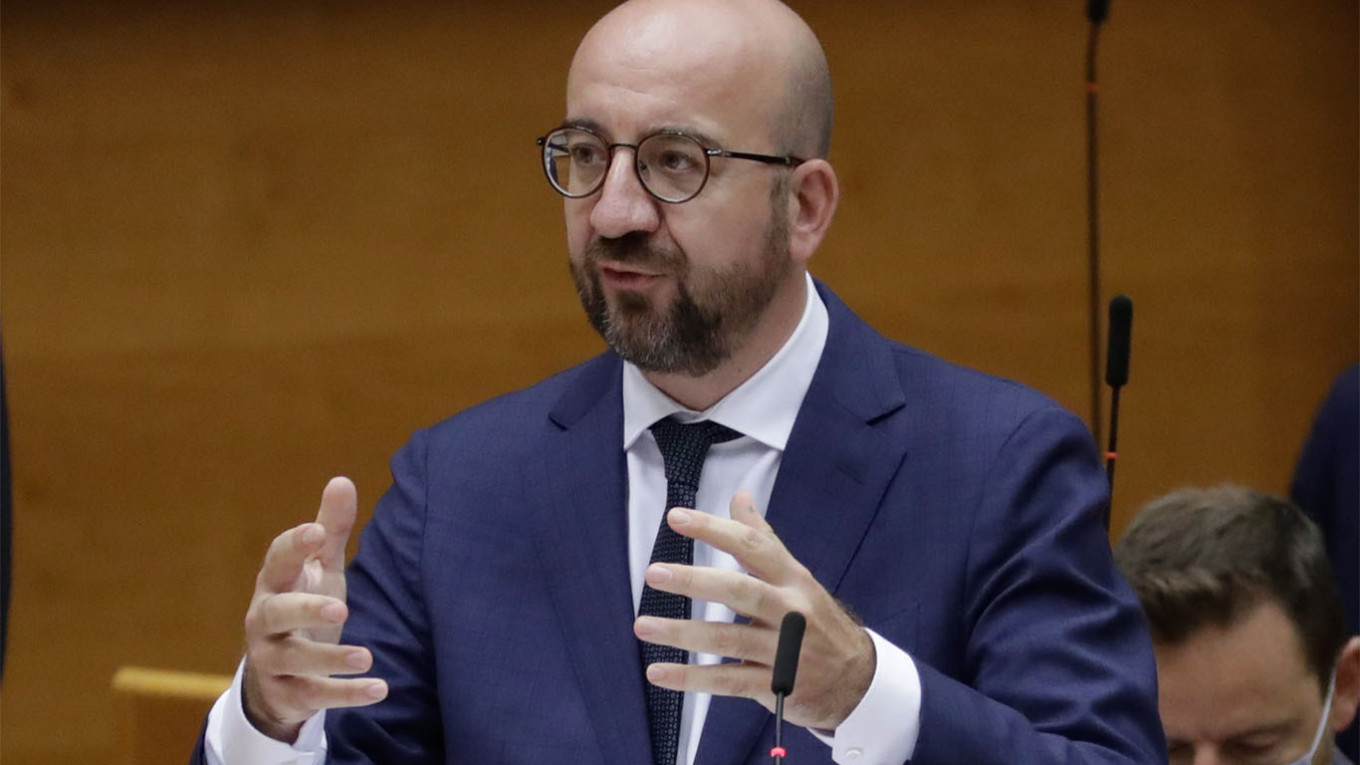
European leaders urged Russian President Vladimir Putin to push for dialogue in neighbouring Belarus on Tuesday, as opposition supporters protested President Alexander Lukashenko’s disputed election win for a 10th day.
Thousands of demonstrators gathered on Independence Square in central Minsk on Tuesday evening waving the red-and-white flags of the opposition and calling on Lukashenko to resign, the latest in a wave of protests after the president claimed he had won a sixth term in the August 9 ballot.
EU chief Charles Michel said on Twitter he had spoken to Putin and added that “only peaceful and truly inclusive dialogue can resolve the crisis in Belarus.”
German Chancellor Angela Merkel and French President Emmanuel Macron also spoke with the Russian leader, whose country has close economic and military ties with its neighbor.
Merkel told Putin that authorities in Minsk must “enter into a national dialogue with the opposition and society to overcome the crisis,” while Macron urged the Russian leader to foster “calm and dialogue.”
In Kremlin readouts of the two calls, Putin emphasized that interfering in Belarus and putting pressure on its authorities would be “unacceptable”, as the European Union moves to impose sanctions over the vote and a brutal police crackdown on protesters.
The flurry of calls came ahead of an emergency video summit of European Union leaders to discuss Belarus on Wednesday.
Belarusian state news agency Belta said Putin and Lukashenko had also spoken by phone to discuss the Russian president’s calls with European leaders.
‘Lawlessness and injustice’
Lithuanian lawmakers on Tuesday urged Western governments not to recognize Lukashenko as president and both the United States and Britain this week voiced concerns over the elections and the crackdown.
Moscow has said it is ready to step in if necessary in Belarus through the CSTO military alliance between six ex-Soviet states.
But it is unclear how much support Putin is willing to give to Lukashenko, who in recent years has often played off Moscow against the West.
Lukashenko has defied calls to hold a new election and on Tuesday handed out awards to 300 members of the security services, who have been accused of abusing arrested protesters.
During a meeting of his security council, Lukashenko accused the opposition of attempting to “seize power,” and rupture Minsk’s economic and military ties with its powerful ally Russia.
“They demand nothing more and nothing less: to transfer power to them,” Lukashenko said of the opposition.
Earlier on Tuesday, several hundred people gathered outside the walls of a detention center to mark the 42nd birthday of Sergei Tikhanovsky, a popular blogger who was imprisoned alongside other Lukashenko rivals ahead of the election.
Tikhanovsky’s wife, Svetlana Tikhanovskaya, was allowed to run in his place but fled to neighbouring Lithuania after claiming that Lukashenko rigged the election to secure his official 80 percent of the vote.
Tikhanovskaya, 37, has said she will organize new elections if Lukashenko steps down and her allies have formed a Coordination Council to ensure a transfer of power.
Historic demonstrations
On Tuesday evening, the council convened its first press conference and announced members — including Nobel Prize-winning author and ardent Lukashenko critic Svetlana Alexievich.
“We are just starting to feel like an independent nation,” Maria Kolesnikova, the campaign manager of a jailed opposition candidate, told journalists during the briefing.
She also denied Lukashenko’s claims that the opposition wanted to cut ties with Moscow and vowed that new leaders in Minsk would “maintain friendly, mutually beneficial, pragmatic,” ties with Russia and EU countries.
In a video message, Tikhanovskaya said her husband was spending his birthday in prison accused of “a crime he did not commit.”
“All of this blatant lawlessness and injustice shows how this rotting system works, in which one person controls everything, one person who has kept the country in fear for 26 years, one person who robbed Belarusians of their choice,” she said.
Belarus over the weekend saw its largest street demonstrations since it gained independence from the Soviet Union, with more than 100,000 people taking to the streets of the capital to demand Lukashenko stand down after 26 years in power.
The police crackdown on post-election demonstrations last week saw more than 6,700 people arrested, hundreds wounded and left two people dead.
Authorities gradually released detainees — many emerging with horrific accounts of beatings and torture. The Interior Ministry reported a third death on Tuesday, of a young man hit by a car while demonstrating.
The first Belarusian diplomat to publicly support the protesters, Minsk’s ambassador to Slovakia Igor Leshchenya, announced his resignation earlier on Tuesday in an interview with the Tut.by news website.
